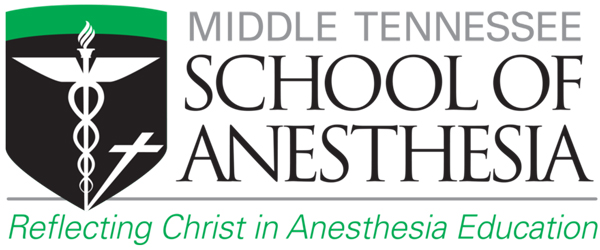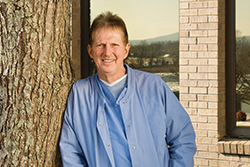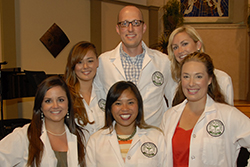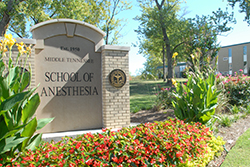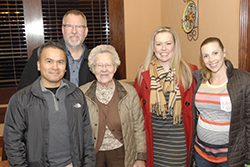Gravois Awarded Prestigious President’s Medal
January 17, 2016
President Hulin Presents Honor at Commencement Ceremony
Middle Tennessee School of Anesthesia Doctor of Nurse Anesthesia Practice Graduate Michele Gravois, DNAP, CRNA was named recipient of the President’s Medal at the MTSA commencement ceremony. MTSA President Chris Hulin (’06) DNP, MBA, CRNA awarded the special tribute and honor during the graduation ceremony held November 20, 2015 at the Madison Campus Seventh-day Adventist Church.
“I was very pleased to present this award to such a deserving candidate,” said Dr. Hulin. “We are very proud of the work she has done in representing the underserved.”
The President’s Medal is presented to an outstanding DNAP graduate recognizing their capstone project that will help advance the current practice of nurse anesthesia. Capstone projects are assessed using the following criteria:
- Significance to nurse anesthesia practice
- Impact on patient care and safety
- Contribution to the current body of knowledge
- Improvement in the healthcare delivery system
- And, the mastery of a subject in a given area
In reaction to being named the President’s Medal recipient, Dr. Gravois said, “Receiving the President’s Medal is a true honor for me. I certainly appreciate the recognition for my project which is an idea close to my heart and practice.”
The Capstone
Dr. Gravois’ capstone project title is:To What Extent Does One Cultural Competence Training Class Affect Hispanic Cultural Competence Among Certified Registered Nurse Anesthetists (CRNAs)? She said, “I started the program with two topics in mind. During the first intensive, I was able to narrow my choice to epidural use in laboring Hispanic women. This focus was inspired by my observations in labor and delivery. I wanted to know why it seemed Hispanic women did not want or receive as many epidurals for labor pain as other races or ethnicities.
“The beauty of the MTSA program was that we were able to have roundtable discussions with other nurse anesthetists and research experts,” said Gravois. “During these conversations, I was introduced to the term ‘health care disparities.’ The faculty really encouraged me to dive into the research and explore the problem. Soon, I was able to define a framework that guided my project with current evidence.
“Once I defined my topic area – “Hispanic Cultural Competence and Anesthesia – my efforts were focused on researching, grading, and categorizing the evidence. Organization was key so that I stayed on track. It was easy to ‘get into the weeds’ because there is so much information available to us now. Continual contact with committee members and classmates was important to making progress.
“Part of my project also involved planning, implementing, and evaluating an intervention. I therefore developed a Hispanic cultural competence class and administered the content to CRNAs. I could not have navigated this process without the expertise of Dr. Michael Vollman, Dr. Maria Overstreet, Dr. Rachel Brown, Dr. Amy Gideon, and Dr. Katrin Sames,” said Gravois.
“Dr. Gravois is compassionate about the topic which gives her the inspiration to drive changes at her work environment,” said MTSA faculty member and Gravois’ Committee Chairperson Katrin Sames (‘07) DNAP, CRNA. “During this entire process of researching and writing, she was always self-motivated and attentive to details while maintaining sight of the bigger picture. Her diligent research and compelling arguments encouraged all of us – as well as her coworkers – to become more culturally competent which leads to improved health care experiences and outcomes for our patients.
“The relevance of her work on the topic will continue to be more and more apparent with the increasingly culturally diverse population, which effects every healthcare provider in the United States. By engaging in more culturally competent care for our patients, we (CRNAs) will improve the health care experience and outcome of our patients.” She continued saying that, “The process of her research, including a pre-test and post-test cited in her project, shows excellent and academically sound work – including relevance with quality work and delivery. It was such a pleasure to work with Michele. She is professional and passionate about her capstone, work, and service to patients.”
Reflections
“The rigors of completing my capstone project taught me the value of sound research. I learned that every aspect of a quality project is intentional and supported by evidence,” said Gravois. “The metaphor ‘standing on the shoulders of giants’ certainly takes on a new meaning for me now.
“In summary, I came to MTSA with an idea. With the assistance of my committee and chairperson, other faculty members, and my classmates, I developed that idea into a project. Fortunately, I was able to implement the project and evaluate the outcomes. Although it had a small sample size, the project had significant value and I’m proud of it.”
Dr. Gravois reflected on how this capstone changed the way she practices anesthesia saying, “I believe cultural influences are very important to the health care experiences of patients, my experiences as their anesthesia provider, and to the health care system as a whole. Therefore, I now strive to be more knowledgeable about individual’s cultural values and to integrate those values into their care.”
Why MTSA?
When asked how a doctoral candidate from Tuscaloosa, Alabama found her way to middle Tennessee and MTSA Dr. Gravois responded, “Honestly, I saw the advertisement on Facebook. The timing seemed to be more than a coincidence because I had been contemplating going back to school. When I saw the ad for MTSA, I began researching the school and everything about the program. The hybrid format and Christian focus were both valuable to me. I spoke with Mindy Mullins (’14) DNAP, CRNA, (2014 President’s Medal winner) who was a student at that time, and she gave me a lot of information. After a bit of soul searching and discussion with my family, I decided to go for it.”
As for choosing MTSA’s DNAP program rather than a traditional DNP degree, she said, “The DNAP was appealing to me because I wanted the anesthesia focus. At MTSA, most of the faculty are CRNAs and our studies would center on topics like education, administration, and evidence-based research/practice as they relate to anesthesia.”
Dr. Gravois commented about the program saying, “The academic environment was unlike anything I had experienced previously. The faculty respected me as a professional and recognized what I could bring to the table. They had a special ability to tap into my talents and encourage me to step outside of my comfort zone. The curriculum was challenging and interesting and I found coursework information and our class discussions to useful in my current practice.” She continued saying, “Now that I have graduated, I’m actually going back to review several of the topics in more detail.”
When asked if she could reflect on a faculty member that had impact or influence in her experience at MTSA, she said, “This is a hard question to answer because I feel like I personally connected with the entire faculty. Each one offered their unique experiences, personalities, and abilities to us.” She continued, “If I had to pick just one, then I would have to say Dr. Katrin Sames. Not only is she a great committee chairperson, Dr. Sames has an unparalleled commitment to patient safety. She was very encouraging and helpful when it came to my capstone project, and communication was always easy, even if she was literally half way around the world. Her dedication to safer anesthesia is also influential. She inspires me to do better for my patients and I hope to use information from her class to improve patient safety at my hospital.”
When Dr. Gravois was asked if she would do it all over again? she said, “Yes, without hesitation. The hybrid format afforded me the flexibility I needed to get work done as well as the personal contact with faculty necessary to learn.” Regarding the choice of MTSA, she said, “The curriculum was designed for CRNAs and therefore relevant to my purposes. I had the opportunity to learn from some of the best and brightest in the business so there has never been a moment of regret. The educational and technological support was outstanding. Finally, the relationships I have made could never be replaced. Although my education at MTSA is complete, I have no doubt that I will remain in touch with my instructors and classmates.”
What’s Next?
Gravois said, “In the near future, I hope to present more cultural competency courses at my work place. There are many reasons to continue learning about the communities we serve and, quite frankly, I find it very interesting. I also hope to publish my current project in the AANA Journal and will start working toward that goal.”
When asked if she had any thoughts or advice for those considering a doctoral program she said, “I would advise current and prospective students to know the real reason why you are seeking this degree (you may need to remind yourself when things get tough); be prepared for the time commitment and have support in place prior to starting; connect with a current or former student who can offer you tips/advice; choose a capstone project topic early but be flexible enough to let it evolve as you search the literature; and, stay organized, especially as you build your database.”
As Dr. Gravois reminisced on receiving the President’s Medal she said, “My committee and classmates were extremely helpful throughout the entire process.” Of course, I could not have done it without their guidance, input, and encouragement. I share this honor with all of them.”
While drawing a spiritual lesson from this process Gravois said, “My reaction to this project parallels what I have learned as a Christian.” She then quoted II Corinthians 10:15 which states,Neither do we go beyond our limits by boasting of work done by others. Our hope is that, as your faith continues to grow, our sphere of activity among you will greatly expand.
“If I glorify God within my sphere of influence, maybe those around me will do the same, so that my efforts are exponential,” said Dr. Gravois. “I do not expect to change the whole world, fix a multi-billion-dollar health care disparity problem, or win a Nobel Prize. My hopes are for the small changes I make to influence those around me in a way which honors Him.”


